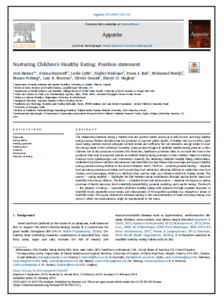Nurturing Children’s healthy eating: position paper – Appetite
The relationship between eating a healthy diet and positive health outcomes is well known; nurturing healthy eating among children therefore has the potential to improve public health. However, many parents struggle to establish healthy eating patterns in their children due to the pressures of modern life. Moreover, healthcare providers often do not have the time or the guidance they need to empower parents to establish healthy eating practices in their children.
Based on existing evidence, the Nurturing Children’s Healthy Eating collaboration has identified four key themes that encourage and support healthy eating practices among children in the modern Western world:
- Positive parental feeding explores how parenting practices and styles can influence children’s dietary intake.
- Eating together highlights the link between eating socialization through regular family meals and healthful diet among children.
- A healthy home food environment explores the impact on eating practices of family resources, food availability/accessibility, parental modeling, and cues for eating.
- The pleasure of eating associates children’s healthy eating with pleasure through repeated exposure to healthful foods, enjoyable social meals, and enhancement of the cognitive qualities (e.g. thoughts or ideas) of healthful foods.
This paper, published in Appetite, reviews the evidence leading to the characterization of these nurturing themes, and ways in which recommendations might be implemented in the home.

